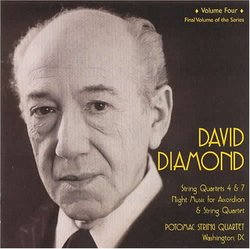| All Artists: David [6] Diamond, Potomac String Quartet Title: David Diamond: String Quartets, Vol. 4 - String Quartets 4 & 7 Members Wishing: 0 Total Copies: 0 Label: Albany Records Release Date: 1/25/2005 Genre: Classical Styles: Chamber Music, Historical Periods, Classical (c.1770-1830) Number of Discs: 1 SwapaCD Credits: 1 UPC: 034061072720 |
Search - David [6] Diamond, Potomac String Quartet :: David Diamond: String Quartets, Vol. 4 - String Quartets 4 & 7
 | David [6] Diamond, Potomac String Quartet David Diamond: String Quartets, Vol. 4 - String Quartets 4 & 7 Genre: Classical
With this final volume, Albany Records is proud to bring to a close one of the finest and most important projects in its entire catalog. The String Quartets of David Diamond, without question, form the finest body of work,... more » |
Larger Image |
CD Details
Synopsis
Album Description
With this final volume, Albany Records is proud to bring to a close one of the finest and most important projects in its entire catalog. The String Quartets of David Diamond, without question, form the finest body of work, in this medium, by any American composer. It is our pleasure that you are now able to judge the truth of that statement for yourselves by being able to hear all of this magnificent music. Diamond's String Quartet No. 4 was completed in 1951, but not premiered until October 1, 1957, in Carnegie Recital Hall. Its impact was powerful, and despite its length and complexity, it was nominated for the 1965 Grammy Award for Best Composition by a Contemporary Classical Composer, subsequently awarded to Charles Ives's Fourth Symphony. The Beaux-Arts String Quartet was the work's passionate advocate in its premiere and subsequent recording made in the 1960s. A review of the recording refers to the Quartet No. 4's fascinating seriousness; its magnificent creativity. The clear directions and purposes of the work make it one of the healthiest chamber compositions that has been composed in America." (Arthur Cohn, The American Record Guide February, 1966). David Diamond has said of Walter Piston, to whom he was introduced by Aaron Copland, "I respected him enormously. I felt that he was one of the few serious composers, along with Copland and Sessions who was very important to listen to. The first thing he said to me was 'I hear you have a great knack for string quartet writing.' I was so pleased to hear this." The Juilliard Quartet premiered the String Quartet No. 7 on November 10, 1966, two years after its completion. His String Quartet No. 6 ended with a multiple variation movement just as No. 7 begins with a theme followed by variations. When asked about his intent, Diamond replied, "I wanted to keep the structure unified and still have a different kind of sound. I was also obsessed with the variation form. I believe that is! what music is all about; it is the ability to make variations on a given idea. That's what made Bach and Beethoven so very important. I have a kind of visual idea of line. Of sustaining and giving shape to the length. So shape has a very important part to play in all of my melodic ideas." When asked whether he played his ideas out on the piano, he responded, "No, I write it out in a sketchbook. After I have a lot of sketches, I will play them through at the piano and revise and make variations. My sketchbooks are full of variants on themes." In the 20th century, the accordion had a powerful lobby to use to expand its recognition as an instrument worthy of classical consideration: the American Accordion Association. The AAA commissioned works from some of the most pre-eminent composers of the last century including Henry Cowell, Paul Creston, Lukas Foss and Wallingford Riegger. Joseph Biviano and the Beaux-Arts Quartet premiered Night Music on May 3, 1962 at Carnegie Recital! Hall. In an interview with the 87 year old composer in September, 2002, Diamond spoke of the work's dedicatee whom he had previously described as "one of the few saintly people I knew in this infamous world." "Wallingford was a very impressive and serious gentleman who always admired my music. So I was always very grateful for his interest. I have very strong memories of him. I never studied with him, but I knew people who did and they said he was an excellent teacher. I dedicated Night Music to him because I had heard about his tragic death in New York City when he was killed on Columbus Avenue when the dog he was walking got into a fight with another dog. The two leashes entangled hurling Riegger to the ground. He died from a resulting head injury."

 Track Listings (3) - Disc #1
Track Listings (3) - Disc #1